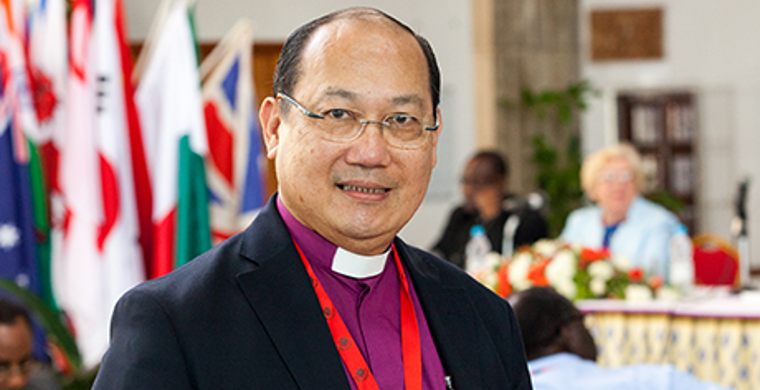BEIJING'S MAN IN THE ANGLICAN COMMUNION
By The Rev. Dr. David Goodhew
THE LIVING CHURCH
June 15, 2021
Justin Welby and official Anglican structures have been silent over the oppression of Uighur Muslims, the people of Hong Kong, and Chinese people generally. Concerning oppression elsewhere they are often much more vocal. For official Anglicanism, Black lives matter (sometimes); Chinese lives, not so much.
Why so silent? There are a range of reasons, not all of them dishonorable. But one key reason is the presence at the heart of official Anglicanism of Archbishop Paul Kwong. He chairs the key Anglican institution, the Anglican Consultative Council (ACC) -- and Kwong has consistently promoted the Chinese Communist Party's stance.
What is the Anglican Consultative Council (ACC)?
The ACC is one of the four "Instruments of Communion" of the Anglican Communion (the other three being: the Archbishop of Canterbury, the Lambeth Conference, and the Primates' Meeting). The council meets every two or three years in varying locations worldwide and has a permanent secretariat. The ACC has met four times since 2009, during which the Lambeth Conference has not met at all. Its most recent meeting, in 2019, was itself in Hong Kong. The lack of a Lambeth conference for the last 13 years has further boosted the ACC, since it is one of the few means by which the Communion congregates.
The Record of Archbishop Kwong
To understand the role of Archbishop Kwong, it is important to recognize the nature of the Chinese Communist Party. Leading human rights organizations such as Amnesty International and Human Rights Watch, as well as a widening range of democratic governments, recognize massive abuses of human rights in China. These center on the Muslim Uighur people, but also on Hong Kong, where its democratic accountability and the independence of judicial process are rapidly being dismantled. Beyond this, hopes among Western powers that China was inching toward a greater respect for the individual and away from the one-party state have been dashed under the rule of President Xi. When politicians as different as Nancy Pelosi and Mike Pompeo agree on the reprehensible nature of China's conduct, surely that is telling us something.
With this in mind, the key fact about Archbishop Kwong is his long-standing membership in the Chinese Communist Party's Political Consultative Conference. This position is held only so long as Kwong articulates a consistently pro-Beijing stance.
For years Kwong has opposed pro-democracy activists. Most memorably in a homily in 2014 he chided protesters, saying he was perplexed as to why they "have to speak up so much." Kwong argued, "Jesus remained silent in the face of Pilate. He was like a lamb awaiting slaughter." He concluded, "sometimes we don't have to say anything. Silence is better than saying anything."
This stance continues. In a letter to the Church Times in 2020 Kwong fulsomely praised the new "National Security Law" in Hong Kong. The effect of this law is to snuff out existing democracy in Hong Kong and undermine the rule of law, in such a way as to make protest both dangerous and, increasingly, impossible. As a result of the National Security Law, anyone who does not support the Chinese state is being jailed, gagged, or driven abroad -- notably lay Christians such as Agnes Chow and Joshua Wong. In this context silence is not "better." Silence is all that is left to Hong Kong people as they watch the destruction of the freedoms they once possessed.
Kwong has made no comment on the deep oppression faced by Chinese Uighur Muslims. Given the determination of the Chinese state to suppress dissent, this is not surprising. But given that such oppression is widely recognized as genocidal, such silence is incompatible with his prominent role in world Anglicanism.
Comparison of Kwong's record with other church leaders' is instructive. Hong Kong church leaders have articulated a range of views, but Kwong is among those closest to the Communist Party. A wide range of other leaders have been more ready to criticize the Chinese state and support pro-democracy activists. Cardinal Joseph Zen Ze-kiun, the former Roman Catholic bishop of Hong Kong, and pastor Roy Chan and lay Christian activists such as Agnes Chow and James Wong, are as courageous as Kwong is supine.
Kwong has occasionally offered criticism of the Chinese state, such as over attempts to remove crosses from the outside of churches. But such criticism is far more muted than his consistent support for the state and hostility to those supporting democracy and human rights.
Where Next?
Go to the website of the Episcopal Church, or that of the Anglican Communion News Service or that of the Archbishop of Canterbury. Search for comment on the oppression of the Muslim Uighur people or the erosion of human rights in Hong Kong. It is not there. Often so vocal, here the Communion is choosing to pass by on the other side.
The presence of Archbishop Kwong at the heart of the Anglican Communion and the Communion's silence about Chinese state oppression is more than coincidence. Individual Anglican bishops have protested, but official Anglicanism is mute.
The Chinese state's entryism has neutered organizations as diverse as the World Health Organization and Jesus College, Cambridge. What has been little noticed is how it has compromised the Anglican Communion.
The Chinese state's massive oppression can no longer be ignored by Anglicans. By ignoring such oppression thus far, the Communion's credibility as a voice against wider injustice is nullified. The first step toward change is a change of personnel. Archbishop Kwong's continued chairing of the ACC hamstrings TEC and the wider Communion from calling out oppression by the Chinese state. Archbishop Kwong should step down from the Anglican Consultative Council.
The Rev. Dr. David Goodhew is Vicar of St. Barnabas, Middlesbrough, and Visiting Fellow of St. John's College, Durham University. He is co-director of the Centre for Church Growth Research and tweets at @CCGR_Durham.














